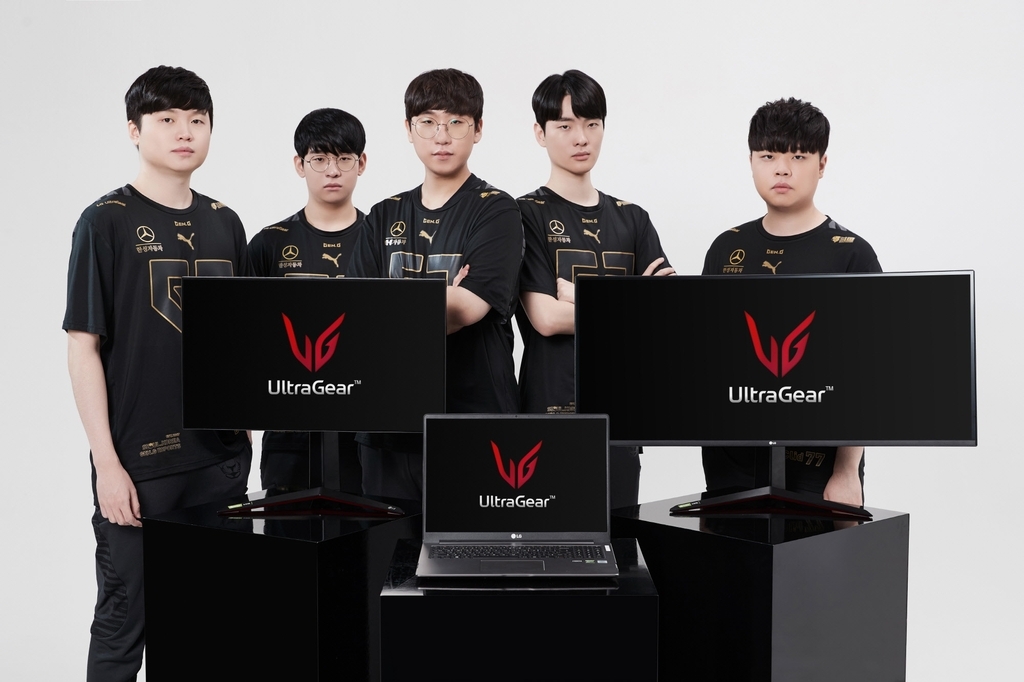
LG Electronics Inc. on Monday said it has signed a partnership with the global esports organization Gen.G to better target young consumers amid the pandemic.
Under the deal, the two sides agreed to seek various business opportunities in the global esports industry and cooperate in promoting LG UltraGear gaming monitor and notebook products.
LG believes the partnership can boost its marketing for the MZ generation, which refers to those born between 1980 and the early 2000s as a combination of millennials and Generation Z.
Founded in 2017, Gen.G runs top-class teams in the competitive gaming sector in online games like "Overwatch," "League of Legends" and "PlayerUnknown's Battlegrounds." It was ranked sixth in Forbes' list of the world's most valuable esports firms in 2020 at $185 million.
LG first hopes the latest deal can increase its monitor sales. Last year, the South Korean tech powerhouse released a new 27-inch UltraGear gaming monitor, the industry's first 4K IPS 1 millisecond Gray-to-Gray product, which boasts fast response time to deliver immersive gaming experience.
According to market researcher TrendForce, LG was ranked sixth place in terms of global monitor shipments in 2020, down one spot from the previous year.
Demand for gaming monitors and notebooks has been growing following new console launches and expanded game streaming from cloud services amid the stay-at-home trend, according to market tracker International Data Corporation (IDC).
It predicted global gaming monitor shipments will reach 16 million units in 2024, up from 12.4 million units in 2020, while that of gaming notebook will increase from 22.3 million units in 2020 to 30.2 million units in 2024. (Yonhap)
Under the deal, the two sides agreed to seek various business opportunities in the global esports industry and cooperate in promoting LG UltraGear gaming monitor and notebook products.
LG believes the partnership can boost its marketing for the MZ generation, which refers to those born between 1980 and the early 2000s as a combination of millennials and Generation Z.
Founded in 2017, Gen.G runs top-class teams in the competitive gaming sector in online games like "Overwatch," "League of Legends" and "PlayerUnknown's Battlegrounds." It was ranked sixth in Forbes' list of the world's most valuable esports firms in 2020 at $185 million.
LG first hopes the latest deal can increase its monitor sales. Last year, the South Korean tech powerhouse released a new 27-inch UltraGear gaming monitor, the industry's first 4K IPS 1 millisecond Gray-to-Gray product, which boasts fast response time to deliver immersive gaming experience.
According to market researcher TrendForce, LG was ranked sixth place in terms of global monitor shipments in 2020, down one spot from the previous year.
Demand for gaming monitors and notebooks has been growing following new console launches and expanded game streaming from cloud services amid the stay-at-home trend, according to market tracker International Data Corporation (IDC).
It predicted global gaming monitor shipments will reach 16 million units in 2024, up from 12.4 million units in 2020, while that of gaming notebook will increase from 22.3 million units in 2020 to 30.2 million units in 2024. (Yonhap)










![[Today’s K-pop] BTS pop-up event to come to Seoul](http://res.heraldm.com/phpwas/restmb_idxmake.php?idx=644&simg=/content/image/2024/04/17/20240417050734_0.jpg&u=)






![[KH Explains] Hyundai's full hybrid edge to pay off amid slow transition to pure EVs](http://res.heraldm.com/phpwas/restmb_idxmake.php?idx=652&simg=/content/image/2024/04/18/20240418050645_0.jpg&u=20240419100350)

